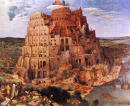 As the e-book evolves, we struggle with various competing formats, argue about DRM and a host of other issues; the technology leaps ahead and we struggle to keep up with the practical details. One of the problems is that in the last 2,000 years the only changes in book formats were scrolls to handwritten books to printing. The technology involved in printing books changed, we got paper instead of vellum or papyrus, but a book was still a book.
As the e-book evolves, we struggle with various competing formats, argue about DRM and a host of other issues; the technology leaps ahead and we struggle to keep up with the practical details. One of the problems is that in the last 2,000 years the only changes in book formats were scrolls to handwritten books to printing. The technology involved in printing books changed, we got paper instead of vellum or papyrus, but a book was still a book.
But what happened in the last great print revolution, when we humans learned to write down our words? It’s almost impossible to understand what a leap of imagination was required to take human voice sounds and turn them into little squiggles which could be read by another person, even one in another far-off town, who also understood the “code.” How long did it take to evolve from pictures of things happening to being able to record speech? And the formats! The Phoenicians wrote from right to left, as Arabic is written. The early Greeks wrote from right to left or left to right and sometimes meandered both ways.
Battles over “letter formats” and “pen technology”
Letters had to be changed to incorporate new vocal sounds and dialects. Most of us only see the end result of neat inscriptions on vases and buildings. No doubt there were times when entire schools of scribes battled it out over “letter formats” and “pen technology.” Tom Holt’s Olympiad gives a very humorous spin to the introduction of writing into Greece by Phoenician traders. I suspect his version is not far from the truth.
On the way to developing standard ways of writing there were no doubt many casualties, as there might be with e-Book formats. We also need to guard against an English-centric view of e-book technologies. Sometimes when faced with writing out classical Greek, Arabic or even music notation, I find myself drifting back to to the old pen and paper method rather than fighting my computer keyboard!


































Public Formatting via Corporate Conglomerates of the American public and the World, is the greatest phenomen, that has to be unformatted, to survive!